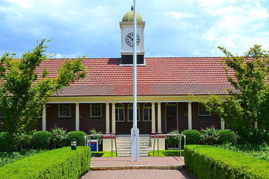
Such evangelicalism also contributed to the flexibility and efficiency of Barker in his organisational achievements, a second key feature of his life we honour today. Perhaps this is another gift of Anglican Evangelicalism which more staid Anglo-Catholic and Broad Church Anglicans must always be prepared to learn. Somewhat laughably as it may seem to us now, Barker was originally appointed to Sydney in order to give him a bit of a rest from his demanding exertions in Liverpool. As it happened, Barker was needed to use all his energy to help establish new institutional arrangements for the expanding Australian Church. This included subdividing his own diocese to create Goulburn diocese in 1863, and Bathurst in 1869. During his time, working with other, more Tractarian, bishops like Tyrrell of Newcastle, as metropolitan of Australia he also oversaw the establishment of what would become major dioceses such as Perth in 1856 and Brisbane in 1859, as well as Grafton and Armidale in 1866, Ballarat in 1875, and North Queensland in 1878. Literally, as well as metaphorically, Barker thus mapped out Anglican pathways in this country. Indeed, it was Barker who presided over the institution of the diocesan synod of Synod, which met for the first time in 1866, and the General Synod in 1872. Like the 19th century diocesan boundaries, we may today wonder whether all those administrative features were ever quite perfect, and they may certainly require fresh flexibility and formation today. Yet these were outstanding achievements which were built to last and prosper.
To return to where I began, the question of how we might we take up Barker’s creative spirit today is one we may also apply to the third major area of his life’s achievements, namely the development of Christian education. Not for nothing was Sydney North Shore boys school named Barker College in his honour when it was founded in 1890. For Barker was a prodigious proponent and builder of Christian education, as an essential core element of a living faith and flourishing Church. Indeed, alongside the completion of St Andrews Cathedral in Sydney, a lasting base for Sydney Anglicanism was established under him with the opening of Moore Theological College in 1856.
So, for all of these things, we can remember Frederick Barker today on the 135th anniversary of his death, with thanksgiving. Yet none of them, of course, would be what he himself would truly want us to recall and celebrate at any length. For if Barker were here he would turn us at once towards the scriptures we have heard today, and not least the person and work of Jesus Christ. All of his achievements were pathways and pointers to that eternal reality. It is not through missional energy, or fine and creative organisation, or Christian education, nor even the finest theological college we could dream up, that we are saved. It is to Christ Jesus we must turn. For as Jesus says in our Gospel today, ‘whoever keeps my word will never taste death.’ It is this deepest, eternal, truth, we share with Frederick Barker and all those who continue to derive inspiration from him and his work. In this may we live and give glory to God. Amen.
by Jo Inkpin, for St Francis College mid-day eucharist, Thursday 6 April 2017
 RSS Feed
RSS Feed